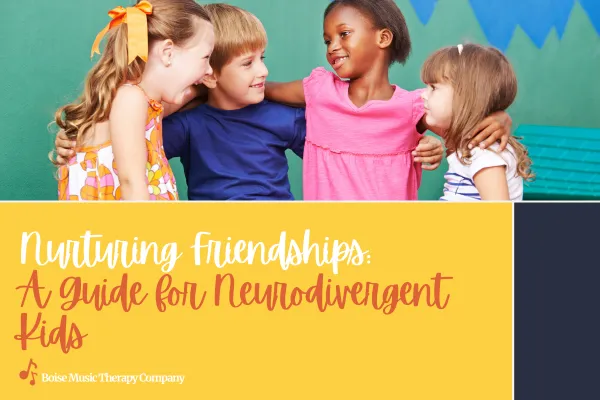
Nurturing Friendships: A Guide for Neurodivergent Kids

Building and maintaining friendships is an essential aspect of a child's development. It provides a sense of belonging, emotional support, and an opportunity for personal growth. For neurodivergent kids, who may experience unique social challenges, fostering meaningful peer relationships can be particularly important. In this blog post, we'll explore some valuable tips and strategies for caregivers to support neurodivergent children in their journey towards building strong and lasting friendships.
1. Celebrate Individual Differences
The first step in nurturing friendships for neurodivergent kids is to foster an environment that celebrates diversity. Encourage children to embrace their own uniqueness and appreciate the differences in others. By promoting acceptance, you lay the foundation for genuine connections based on respect and understanding.
2. Promote Empathy and Social Skills
Empathy is a crucial skill for building meaningful relationships. Engage your child in activities that promote understanding of emotions and perspectives. Role-playing scenarios or using books and media to discuss feelings can be effective tools.
3. Provide Structured Social Opportunities
Many neurodivergent children benefit from structured social settings where they can practice and develop their social skills. This could be through organized playdates, group activities, or clubs that align with their interests.
4. Encourage Clear Communication
Effective communication is key to any successful friendship. Support your child in expressing themselves clearly and encourage active listening. Provide them with tools like visual aids to help them navigate social interactions.
5. Identify Shared Interests
Help your child find activities or hobbies that they are passionate about. Shared interests provide a natural platform for connecting with peers who have similar likes and passions.
6. Model Healthy Relationships
Children learn by example. Model positive friendships in your own interactions. Demonstrate kindness, respect, and understanding in your relationships, so your child can observe and internalize these behaviors.
7. Teach Problem-Solving Skills
Conflicts are a natural part of any relationship. Teach your child constructive ways to navigate disagreements and find resolutions. Encourage them to express their feelings and listen to the perspectives of others.
8. Provide a Safe Space for Self-Expression
Create an environment where your child feels comfortable expressing themselves authentically. This might involve sensory accommodations, allowing for downtime, or providing tools that help regulate emotions.
9. Celebrate Small Achievements
Recognize and celebrate the small victories your child achieves in their social interactions. This could be initiating a conversation, sharing a toy, or cooperating in a group activity. Positive reinforcement can boost their confidence and.
10. Seek Support and Resources
Connect with support groups, online communities, or local organizations that specialize in neurodiversity. These resources can provide valuable insights, advice, and a network of individuals who understand and can relate to your experiences.
Remember, building friendships is a gradual process that requires patience and understanding. Each child is unique, and what works for one may not work for another. Tailor your approach to your child's specific needs and preferences, and always celebrate their progress, no matter how small. With the right support and guidance, neurodivergent kids can forge meaningful connections that enrich their lives.
